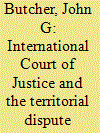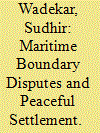| Srl | Item |
| 1 |
ID:
121880


|
|
|
|
|
| Publication |
2013.
|
| Summary/Abstract |
In the early 1990s Indonesia and Malaysia were locked in a long-running and bitter dispute over the ownership of two tiny islands in the Sulawesi Sea and the associated question of maritime boundaries in this area rich in oil and gas deposits. Neither government had ever referred a dispute with another state to the International Court of Justice but in 1996 President Soeharto agreed to Malaysia's proposal to ask the ICJ to issue a ruling on the dispute between the two countries. In 1998 Indonesia and Malaysia asked the ICJ to rule on the ownership of the islands. They did not, however, ask it to rule on the far more important question of their maritime boundaries in the Sulawesi Sea. The ICJ's judgement in 2002 that the islands belonged to Malaysia therefore left that question unresolved. The article argues that because of Indonesia's experience with the ICJ and the high stakes involved for both countries any resolution of the boundary dispute - which came close to open conflict in 2005 - will almost certainly be the result of state-to-state negotiations rather than a ruling by the ICJ or any outside body.
|
|
|
|
|
|
|
|
|
|
|
|
|
|
|
|
| 2 |
ID:
175425


|
|
|
|
|
| Summary/Abstract |
Socio-economic security has motivated African states to explore natural resources in areas of overlapping maritime claims. However, Africa’s maritime boundaries are characterized by unresolved disputes. Resolution of these disputes is time-consuming, expensive and can undermine the state’s ability to exploit natural resources. The Somalia and Kenya maritime dispute under litigation with the International Court of Justice demonstrates the continental commitment to peaceful resolution. Citing cases from across Africa, we discuss outright delimitation or Joint Management Zones (JMZs) as means to address disputes over shared resources, particularly transboundary fisheries, which have received little attention. Reframing the Kenya-Somalia maritime dispute resolution process as cooperation over fisheries management will have spill-over effects into greater diplomatic relations. Fish do not abide by maritime boundaries. As such, we posit that the peaceful resolution of maritime boundary disputes lies in Africa’s ability to consider settlements by way of JMZs to motivate sustainable use of natural resources.
|
|
|
|
|
|
|
|
|
|
|
|
|
|
|
|
| 3 |
ID:
187324


|
|
|
|
|
| Summary/Abstract |
United Nations Convention on the Law of the Sea (UNCLOS) is useful to settle the maritime boundary disputes between the parties. However, the LOS agreement did not settle the question of what states should do when maritime claims overlap because states are less than 400 nm apart or when two nations have adjacent economic zone. Art. 15 allow states to claim the median line as the maximum while states are negotiating. LOS does not provide a specific solution as to how divide overlapping maritime claims. States are competing for the utilization of the maritime resources. In the future, there is possibility of more maritime disputes among the states.
|
|
|
|
|
|
|
|
|
|
|
|
|
|
|
|